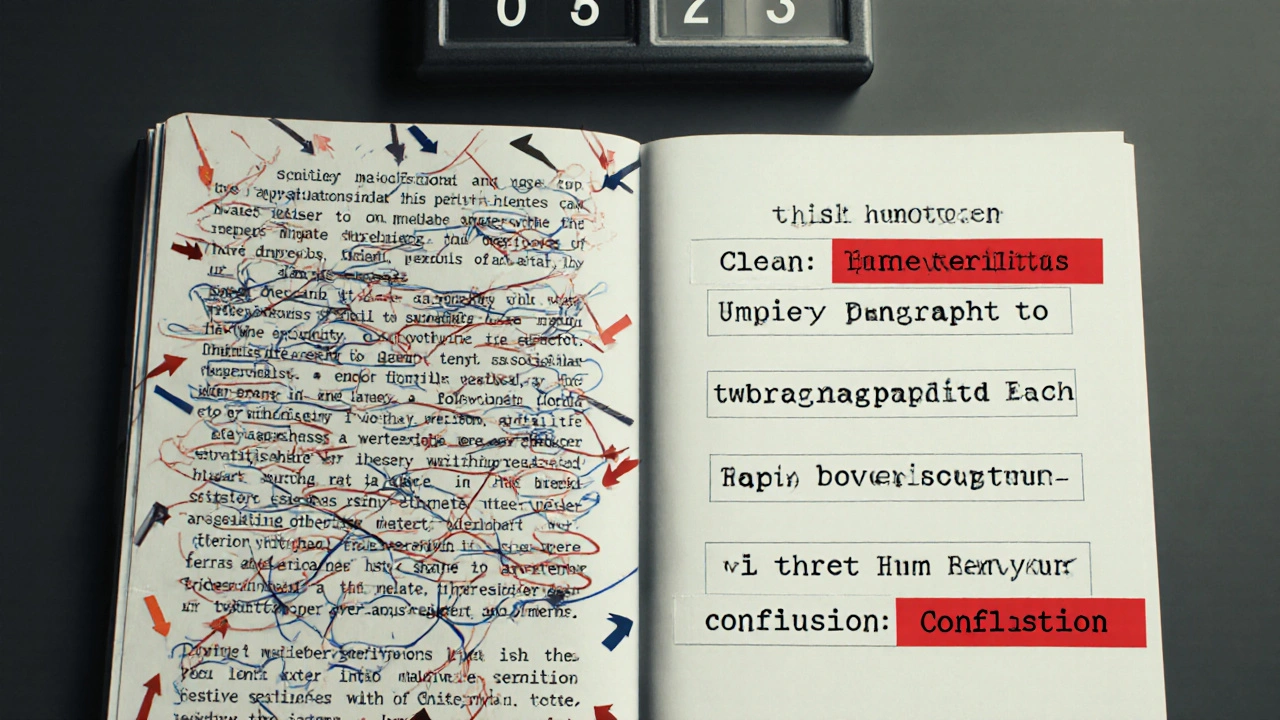
Why exam essay planning isn’t optional - it’s your lifeline
You’ve got 45 minutes to write a high-scoring essay. The clock is ticking. Your mind is racing. And you haven’t even started. This isn’t hypothetical - it’s the reality for thousands of UK students every exam season. The truth? The difference between a C and an A isn’t always what you know. It’s how fast and clearly you can organize what you know. Planning isn’t a luxury. It’s the first step in every top-scoring essay - especially when time is tight.
Most students skip planning because they think it eats up time. But here’s what actually happens when you don’t plan: you write the same point twice, go off-topic, run out of time, and end up with a messy, unfocused essay. That’s not a lack of knowledge. That’s a lack of structure. And structure starts with five minutes of planning.
The 5-minute plan that works under exam pressure
There’s no magic formula, but there is a proven method. It’s simple. It’s fast. And it’s used by top-performing students across England, Wales, and Scotland. Here’s the breakdown:
- Read the question twice. Underline the key command words - ‘evaluate’, ‘discuss’, ‘to what extent’, ‘compare’. These tell you exactly what the examiner wants.
- Brainstorm in 60 seconds. Write down every idea you have. Don’t filter. Just dump. Use bullet points. Even if it’s just a phrase like ‘Marx on alienation’ or ‘1984 surveillance state’.
- Pick 3 strong points. Not five. Not seven. Three. Each point needs to directly answer the question. If it doesn’t, cut it.
- Assign evidence to each point. For each of your three points, pick one key example, quote, or study. Keep it specific. ‘Smith (2020) found that…’ is better than ‘some people say…’.
- Write your opening and closing line. One sentence to start. One sentence to end. These are your anchors. They keep your essay focused.
This plan takes 4-6 minutes. And it’s the reason why students who use it consistently score 20-30% higher than those who don’t. You’re not wasting time. You’re buying back control.
How to structure your essay so it’s easy to follow - even under stress
Examiners mark hundreds of essays a day. They’re tired. They’re looking for clarity. Your job isn’t to impress them with fancy words. It’s to make their job easy.
Stick to this structure - every time:
- Introduction (1 paragraph): Restate the question in your own words. State your position clearly. Mention your three points. Done. No fluff.
- Body paragraphs (3 total): One for each point. Start with a topic sentence that links directly to your plan. Then give your evidence. Then explain how it answers the question. Don’t just describe - connect.
- Conclusion (1 paragraph): Don’t introduce new ideas. Summarize your three points. Restate your answer to the question. End with a strong final line that shows you’ve thought it through.
This structure is predictable. That’s the point. Predictable = easy to mark. Easy to mark = higher scores. It’s not sexy. But it works.

Timing breakdown: How to split your 45 minutes (or 60, or 90)
Timing isn’t guesswork. It’s a system. Here’s how to divide your time based on common UK exam lengths:
| Exam Length | Planning | Writing | Review |
|---|---|---|---|
| 45 minutes | 5 minutes | 35 minutes | 5 minutes |
| 60 minutes | 5-7 minutes | 45 minutes | 8 minutes |
| 90 minutes | 7 minutes | 75 minutes | 8 minutes |
Notice something? Planning never takes more than 7 minutes. And review isn’t optional. Even if you’re out of time, spend the last 3-5 minutes scanning for:
- Spelling errors (especially names and key terms)
- Repeated words
- Missing links between paragraphs
- Did you answer the question? (Check your intro and conclusion)
That’s it. No rewriting. No adding new ideas. Just fixing the obvious.
What to do when your mind goes blank mid-exam
You’re halfway through your second paragraph. Suddenly, you can’t remember the name of the theory. Or the date. Or the author. Panic sets in. Your heart races. Time slips away.
Here’s what to do:
- Don’t stop writing. Keep going. Use phrases like ‘a key study by a leading sociologist’ or ‘the argument made in the 1990s’. You can fill in the name later if you remember it.
- Move to your next point. Skip ahead. Write the next paragraph. Often, the answer comes back when you’re not forcing it.
- Use context clues. If you’re writing about the Industrial Revolution and you forgot a date, write ‘in the early 1800s’ - it’s close enough. Examiners care more about your analysis than perfect recall.
- Don’t erase. Cross it out neatly. Keep writing. Erasing wastes time and stresses you out.
Blanking happens to everyone. The difference between top students and everyone else? They keep moving.

Common mistakes that cost marks - and how to avoid them
- Writing a story instead of an argument. Exams aren’t creative writing. Don’t narrate events. Analyze them. Ask: ‘Why does this matter?’
- Using vague language. Avoid ‘some people think’, ‘a lot of’, ‘it is believed’. Be specific: ‘Marx argued’, ‘the 2023 Ofsted report found’.
- Ignoring the question. If the question asks ‘to what extent’, you must weigh both sides. Don’t just agree or disagree - explain the balance.
- Writing too much. More words don’t mean more marks. A clear 800-word essay beats a rambling 1,200-word one.
- Forgetting the conclusion. A weak ending kills a strong essay. Even if you’re out of time, write one sentence.
These aren’t nitpicks. These are the exact reasons students lose marks - even when they know the content.
Practice like it’s real - before the exam
You wouldn’t run a marathon without training. Why write an exam essay without practicing under timed conditions?
Do this once a week for the month before your exam:
- Grab a past paper question.
- Set a timer for the exact exam length.
- Plan for 5 minutes. Write for the rest.
- Stop when the timer ends - no extra time.
- Compare your essay to the mark scheme. What did you miss? What did you nail?
After three rounds, you’ll notice something: your planning gets faster. Your structure gets tighter. Your confidence grows. You stop panicking because you’ve done it before - under pressure.
Final thought: It’s not about being perfect. It’s about being consistent.
Top grades don’t come from genius. They come from routine. From knowing exactly what to do when the clock starts ticking. From having a system so simple, you can use it even when you’re stressed.
You don’t need to write like a poet. You don’t need to quote every theorist. You just need to plan, structure, and answer the question - clearly and calmly.
That’s how you turn pressure into performance.
How long should I spend planning an exam essay?
For most UK exam essays, spend 5 to 7 minutes planning - no more. That’s enough time to identify the key question, pick three strong points, assign evidence, and write a clear opening and closing line. Planning longer than 10 minutes cuts into writing time and increases stress. The goal is efficiency, not perfection.
What if I can’t remember a key fact or name during the exam?
Don’t panic. Use context. Instead of saying ‘Durkheim’s theory of anomie’, write ‘the sociologist who studied social breakdown in modern societies’. Examiners care more about your understanding than perfect recall. Keep writing. Often, the detail comes back as you move to the next point. Never stop writing - just skip and come back if you can.
Is it okay to write in bullet points during planning?
Yes - and you should. Planning isn’t for the examiner. It’s for you. Bullet points, abbreviations, and shorthand are all fine. Use symbols like ‘→’ for ‘leads to’ or ‘+’ for ‘supports’. The goal is speed and clarity. Full sentences waste time here.
Should I write my introduction first?
No. Write your introduction after you’ve planned your three points. That way, you know exactly what you’re going to say. Writing it too early often leads to mismatched content. Your intro should summarize your plan - not guess at it.
Do examiners care about handwriting?
They care about readability - not beauty. If your handwriting is messy but legible, you’re fine. If it’s hard to read, you risk losing marks. Use clear capital letters for key terms. Leave space between lines. Avoid scribbles or cross-outs. Neatness matters more than speed when it comes to being understood.
Can I use the same essay structure for every subject?
Yes - the three-point structure works for history, English, sociology, politics, and philosophy. The only difference is the type of evidence: dates and events for history, quotes and themes for English, studies and theories for sociology. The structure stays the same. Adapt the content, not the framework.
What’s the biggest mistake UK students make in exam essays?
The biggest mistake? Writing what they think the examiner wants to hear instead of answering the actual question. Many students memorize essays and try to force them into any prompt. That leads to irrelevance. Always start by asking: ‘What is this question really asking?’ Then build your answer around that.